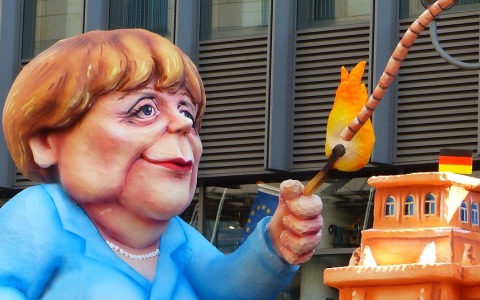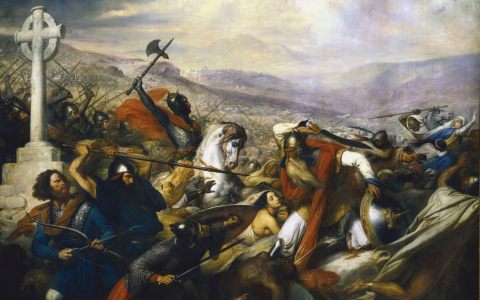ANALYSIS Is Christianity killing Europe?
by - 27th July 2016

IN 1954 German Lutheran theologian Horst Kasner brought his wife and three young children across the Iron Curtain to take up a role in a new parish.
Nothing unusual in that – 200,000 Germans headed from East to West Germany that year – except that Mr Kasner was heading in the other direction.
They settled north of Berlin, where the churchman and his wife raised their children in a former seminary. It was in this deeply religious environment that his eldest daughter Angela grew up, beginning her long career first in academia, and after her first marriage to Ulrich Merkel, in politics.
Chancellor Merkel may go down in history as the woman who invited the world to come to Germany, and so set off the disintegration of the European Union.
But there is an overlooked angle to the story – how her religious upbringing, and the Christian culture of the continent, helped to inspire its leaders’ immigration policies.
As a Catholic I’ve come to the conclusion that our contemporary version of the faith, and the actions of our religious leaders, are actually threatening our future. The shocking Islamist murder yesterday of a priest in Normandy while he said Mass has only deepened this concern.
Europe’s churches have long been active in campaigning for refugees, and in this current crisis both the Pope and Archbishop of Canterbury have invited Syrians to stay at their own homes, while calling on others to help too.
The suffering of the Syrians moves people from all backgrounds, but for Christians there is a particular urge to help: Jesus’s family were refugees and in one of his most famous parables Christ urged people not to hate Samaritans because they were different.
(On top of this Syria, being the land of St Paul, has a special importance to the faithful.)
The need to break down barriers is at the heart of Christianity, which is both its great strength, but also its weakness; the legacy of Christianity partly explains why the world wants to come to Europe, but also why Europe lacks the sense to stop them.
The word religion comes from the Latin religare, literally ‘to bind’, and, throughout history that has been its purpose. Religions emerged, from an evolutionary perspective, to bring humans together as a community, telling creation myths to strengthen social cohesion and setting out laws to reduce anti-social behaviour.
When humans moved from hunter-gatherer bands of 150 or so people to much larger agricultural societies of up to 10,000 strangers, these religions became more sophisticated and more focussed on keeping behaviour in check with watchful gods. But what all early religions had in common was a division between the believer and outsider, because that was necessary for survival; as an ancient rabbi asked, ‘If I am not for myself, who will be for me?’
Soul
Christianity changed all that. It borrowed the ancestral religion of one group and offered a mass-market version to everyone, using the safety provided by the Roman Empire to spread its idea that salvation was open to all.

After Rome fell it then established itself as the new religion of the nations that followed, and after Frankish leader Charles Martel defeated a Muslim army at Tours (also known as the Battle of Poitiers) in 732, a chronicler coined a new word to describe what united the faithful – ‘Europeenses’ – Europeans. Christendom was born.
And as Christianity has declined in Europe, its ideas have lived on and sort of mutated into the social justice religion which still derives much of its logic from the old faith.
The transgender cause, for instance, partly rests on the idea we each have a ‘soul’, rather than just biological mechanisms.
Anti-racism has at its heart St Paul’s idea that we are all united in Christ, whatever our ethnic group, and the anti-racist story, epitomised by Martin Luther King and Nelson Mandela, would not have been possible without Christianity.
This universalism is what makes European Christian countries so nice to live in, but the downside is what is called ‘pathological altruism’; that is, altruism that harms the interests of one’s own group and favours people who might not reciprocate. This did not matter while the simple fact of geography kept different parts of the world distant, and when newcomers were expected to conform, but in the jet age – and especially the smart phone age – it presents a serious weakness.
The downside of Christian universalism is that it invites settlement from people who are themselves clannish and divide the world into an in-group and out-group, often between the believers and non-believers.
And for all the sympathy one might feel for the migrants as individuals, there is no way such large-scale movement of clannish people into decadent societies will not cause social unrest.
Moral
Importing significant numbers of people from outside Europe is clearly not in our continent’s interests, yet it is hard to make the moral argument because of the logic that we should not discriminate against the outsider, something ingrained in us by Christianity.
In some ways this is a misreading of the faith, for Christianity is about voluntary altruism, whereas forcing one’s poorer countrymen to make the sacrifices (and it would inevitably fall on the poor, whose neighbourhoods would be home to the refugees), is not.
But that is a complex argument to make, and it is one that no bishop does.
In fact the Anglican and Roman Catholic churches have long campaigned for more immigration to Britain, despite the evidence that it reduces social solidarity and harms the poor they are supposed to champion; the Catholic Church even campaigned for an immigration amnesty, even though similar schemes in Spain and the United States led to a huge increase in subsequent migration.
These churches may be acting out of self-interest, as many migrants from eastern Europe and elsewhere are churchgoers, but they are certainly not serving the need of the community at large.
It is sad and strange that the country that almost destroyed Europe with pathological nationalism now threatens it with pathological altruism; but one cannot ignore the role that Christianity and the churches have played in this debacle.
 Ed West is a blogger for The Spectator and author of The Diversity Illusion. @edwest
Ed West is a blogger for The Spectator and author of The Diversity Illusion. @edwest
